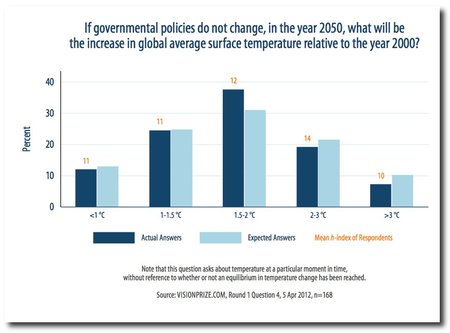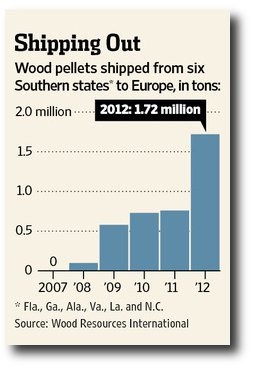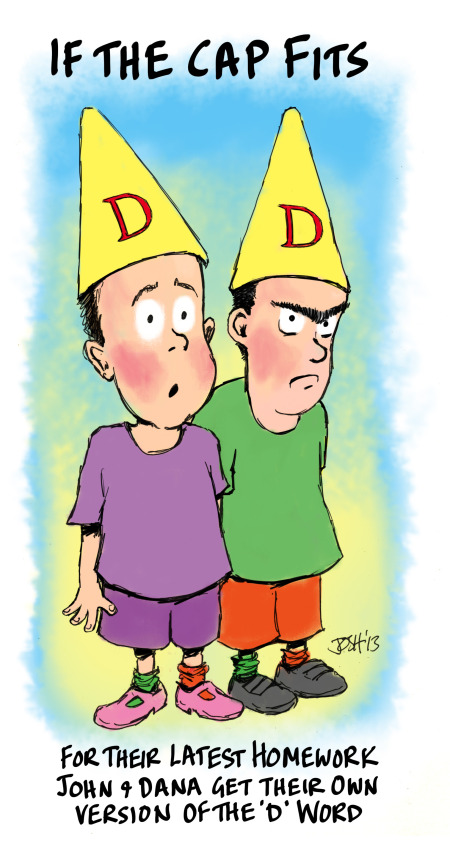 Bishop Hill
Bishop Hill Entries from May 1, 2013 - May 31, 2013
 Bishop Hill
Bishop Hill  Bishop Hill
Bishop Hill Vision of awfulness
 May 31, 2013
May 31, 2013  Climate: sensitivity
Climate: sensitivity The Vision Prize describes itself an "an online platform for communicating expert opinion on climate risk" and seems to be essentially a fairly basic online poll.
I was intrigued by the way its experts assessed climate sensitivity. The relevant question was what the effect on temperature relative to the year 2000 will be if carbon dioxide concentrations reach 550ppm (i.e the first doubling, expected around mid-century).
Here are the results:
The mode is 1.5-2.0°C. Given that this is temperatures relative to the present day, we have to add say 0.8°C to get the "climate sensitivity" figure, which would be 2.3-2.8°C. It seems to me that this figure is hard to justify if transient climate response is 1.3°C and effective climate sensitivity is 1.7°C, as seems likely from the empirical evidence.
Perhaps then the results are affected by climatologists who lie to promote political action.
 Bishop Hill
Bishop Hill Yeo clarifies to obscure
 May 30, 2013
May 30, 2013  Climate: Parliament
Climate: Parliament Tim Yeo has issued a statement "clarifying" his views on climate change:
In the light of what has appeared on the Telegraph website suggesting that I have changed my views about climate change, I wanted to make clear that this is not the case.
My views have remained the same for over two decades. I accept the overwhelming scientific evidence that human activities are having a major impact on the climate – there is an overwhelming probability that the impact of greenhouse gas emissions from human actions are contributing to climate change.
I will continue to press for urgent action on this matter, making the case that the move to a low carbon economy is not just right environmentally but also in our economic interest.
Meanwhile the Telegraph has released its audio recording of what Yeo said (here). His remarks do seem to me to represent a toning down of his position, but it's possible that we are over-interpreting.
 Bishop Hill
Bishop Hill Now I've heard everything
 May 29, 2013
May 29, 2013  Climate: Parliament
Climate: Parliament Tim Yeo is once again demonstrating his unerring ability to bend with the wind:
Tim Yeo, the chairman of the Commons Energy and Climate Change committee, said he accepts the earth’s temperature is increasing but said “natural phases” may be to blame.
Such a suggestion sits at odds with the scientific consensus. One recent survey of 12,000 academic papers on climate change found 97 per cent agree human activities are causing the planet to warm.
As an aside, can I just point out to the learned journalist at the Telegraph that there is quite a lot of ground between "humans to blame" and "humans not to blame". There are at least fifty shades of "humans partly to blame".
 Bishop Hill
Bishop Hill Environmentalism brings you forest clear-cutting
 May 28, 2013
May 28, 2013  Energy: biofuels
Energy: biofuels Thanks to the efforts of environmentalists such as Friends of the Earth and WWF, forests in the southern USA are being clearcut in an effort to meet European demand for wood pellets - a demand that has been driven by biomass power generation.
 Bishop Hill
Bishop Hill Hope and change
 May 28, 2013
May 28, 2013  Climate: Sceptics
Climate: Sceptics The prime minister's new parliamentary adviser on climate change, George Eustice MP, has committed the hanging offence of suggesting that global warming sceptics should be heard in public:
Science questioning climate change should not be "rubbished or ridiculed", a Westcountry MP charged with devising energy policy for David Cameron has said.
George Eustice, Conservative MP for Camborne and Redruth, says he believes there is a link between carbon emissions and warming the planet, but argues "all perspectives" should be heard.
On its own, the statement doesn't amount to very much, but as another sign of a gradual change, it's all to the good.
 Bishop Hill
Bishop Hill Tom Chivers on climate sensitivity
 May 28, 2013
May 28, 2013  Climate: sensitivity
Climate: sensitivity The Telegraph's Tom Chivers has joined the throng of journalists who have covered the low climate sensitivity story. His take, which is pretty level-headed, is here.
There are some gripes, however:
- the suggestion that Otto is a an outlier - a single paper - is demonstrably nonsense. There are now many papers showing climate sensitivity less than 2°C.
- the suggestion that the heat is all going into the oceans is at best only "possible". All the studies with low climate sensitivity take ocean heat uptake into account (or, in Forster and Gregory's case use a methodology that is unaffected by it). Trenberth's new suggestion that the heat is below 2 km depth in the deep ocean is at best speculative.
That said, it's not a bad piece at all and is well worth a look.
 Bishop Hill
Bishop Hill ‘Landmark consensus study’ is incomplete
 May 27, 2013
May 27, 2013  Climate: other
Climate: other This is a guest post by Shub Niggurath.
 In a self-publicized Environmental Research Letters paper, Cook et al claim to have performed a climate consensus-hunting literature survey they call "the most comprehensive of its kind" using "the largest sample". The comprehensive nature of the survey is important to the author and his group. For instance, close associate Lewandowsky writes:
In a self-publicized Environmental Research Letters paper, Cook et al claim to have performed a climate consensus-hunting literature survey they call "the most comprehensive of its kind" using "the largest sample". The comprehensive nature of the survey is important to the author and his group. For instance, close associate Lewandowsky writes:
 Bishop Hill
Bishop Hill Met insignificance
 May 27, 2013
May 27, 2013  Climate: Statistics
Climate: Statistics  Climate: Surface
Climate: Surface This is an ultrasimplified version of Doug Keenan's post this morning.
The Met Office has consistently said that the temperature rise since 1850 is too large to have been caused by natural causes. Questioning from Lord Donoughue elicited the information that they came to this conclusion by modelling temperatures as a straight-line trend (global warming) plus some noise to represent normal short-term variability.
However, would a model in which temperatures went up and down at random on longer timescales, but without any long-term trend at all, be a better match for the real temperature data? Doug Keenan has come up with just such a "temperature line wiggling up and down at random" model and it is indeed a much better match to the data than the "gradual warming plus a bit of random variation" model used by the Met Office. In fact it is up to a thousand times better.
In essence then, the temperature data looks more like a line wiggling up and down at random than one that has an impetus towards higher temperatures.* That being the case, the rises in temperature over the last two centuries and over the last decades of the twentieth century, look like nothing untoward. The global warming signal has not been detected in the temperature records.
*Here I'm only referring to the two models assessed. This is not to say there isn't another model with impetus to higher temperatures which wouldn't be a better match than Doug's model. It's just nobody has put such a )third model forward yet. (H/T JK in the comments)
 Bishop Hill
Bishop Hill Met Office admits claims of significant temperature rise untenable
 May 27, 2013
May 27, 2013  Climate: Statistics
Climate: Statistics  Climate: Surface
Climate: Surface This is a guest post by Doug Keenan.
It has been widely claimed that the increase in global temperatures since the late 1800s is too large to be reasonably attributed to natural random variation. Moreover, that claim is arguably the biggest reason for concern about global warming. The basis for the claim has recently been discussed in the UK Parliament. It turns out that the claim has no basis, and scientists at the Met Office have been trying to cover that up.
The Parliamentary Question that started this was put by Lord Donoughue on 8 November 2012. The Question is as follows.
To ask Her Majesty’s Government … whether they consider a rise in global temperature of 0.8 degrees Celsius since 1880 to be significant. [HL3050]
 Josh
Josh Significantly Met O££ice - Josh 223
 May 26, 2013
May 26, 2013  Climate: MetOffice
Climate: MetOffice  Climate: Models
Climate: Models  Josh
Josh  Bishop Hill
Bishop Hill Ian Fells on energy shortfalls
 May 26, 2013
May 26, 2013  Energy: gas
Energy: gas  Energy: grid
Energy: grid Professor Ian Fells was interviewed on the BBC's PM programme about the story that Britain recently came within 6 hours of running out of gas. He is very interesting on the electricity supply problems a couple of years ago, suggesting that, despite official denials, these were due to a lack of gas.
The audio file is attached below.
 Bishop Hill
Bishop Hill Myles' fighting talk
 May 26, 2013
May 26, 2013  Climate: Allen
Climate: Allen  Climate: WG3
Climate: WG3 Myles Allen has entered the climate fray again, with an article in the Mail on Sunday which strikes several blows at UK energy policy, and in particular windfarms, carbon trading and carbon taxes.
90 per cent of the measures adopted in Britain and elsewhere since the 1997 Kyoto agreement to cut global emissions are a waste of time and money – including windfarms in Scotland, carbon taxes and Byzantine carbon trading systems.
Unfortunately, he thinks the answer lies in carbon capture, an approach that can best be described as "speculative". However, recognition of the madness is the first step towards a cure, so we should probably welcome Myles' move.
 Bishop Hill
Bishop Hill Lilley's reply to Anderson
 May 25, 2013
May 25, 2013  Climate: Parliament
Climate: Parliament  Energy: gas
Energy: gas  Greens
Greens A couple of weeks ago, we discussed Professor Kevin Anderson's rather strange article in which he claimed, somewhat improbably, that Peter Lilley had maligned him. Lilley has now passed on his response to Anderson, which I am reproducing here with his permission.
Dear Professor Anderson,
Thank you for drawing my attention to your response to my Spectator article on shale gas. I apologise for the delay in replying.
I am sorry if you were offended to be called the ayatollah of the green movement. Far from being intended as an insult, it referred to your extreme frankness.







